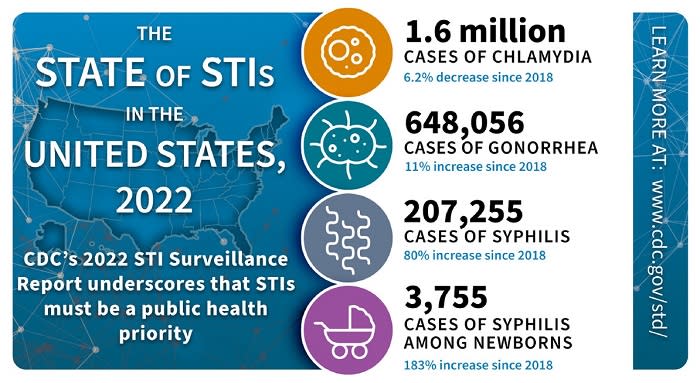CDC report: Chlamydia, gonorrhea rates down in NC in 2022, syphilis rate up
RALEIGH, N.C. (WNCN) — The Centers for Disease Control and Prevention has released their annual sexually transmitted infections surveillance report for 2022 — the most recent year with complete data — and it shows an alarming spike in one type of infection nationwide.
Although the rate for chlamydia has remained relatively unchanged and the rate for gonorrhea has decreased overall in the U.S. since 2021, the rates for syphilis and congenital syphilis have jumped up significantly, leading the CDC to note that the “syphilis epidemic is worsening.”
In 2021, a total of 173,858 syphilis cases were reported. That increased to 203,500 reported cases in 2022 — an increase of 17 percent.
Even more alarming is the rate of congenital syphilis, which occurs when an infected mother passes it to her baby during pregnancy. That rate skyrocketed 30.6 percent from 2021 to 2022.
US sees record number of syphilis cases

In North Carolina, the changes in rates were very similar to the nationwide trends.
Though the Tar Heel State still has some of the highest rates of chlamydia and gonorrhea in the country, the rates for both went down from 2021 to 2022.
The rate of chlamydia in North Carolina dipped slightly from 603.3 cases per 100,000 people to 603.1 cases. The state had the seventh-highest rate in the nation for that infection for the second year in a row.
The one-year drop for gonorrhea was more dramatic, from 271.2 cases per 100,000 people to 249.7. The decrease moved North Carolina down one spot from to the eighth-highest rate in the country.
CDC investigating possible cluster of cancer cases linked to UNC Hospitals lab
Like the rest of the country, the rate of primary and secondary syphilis saw a jump in the state, from a rate of 17.7 cases per 100,000 people in 2021 to 23.1 in 2022. The increase meant North Carolina moved up two spots to the 15th-worse rate in the country.
The CDC urges prevention and testing to help stop the spread of STIs. Chlamydia, gonorrhea and syphilis are all curable if caught early and given the right treatment.
“The most alarming concerns center around the syphilis and congenital syphilis epidemics, signaling an urgent need for swift innovation and collaboration from all STI prevention partners,” the CDC said. “CDC will continue to examine this finding closely and look to 2023 data fro better understanding, but recognize this finding may be a cause for an even closer look at public health efforts and redoubled prevention strategies.”
For the latest news, weather, sports, and streaming video, head to CBS17.com.

